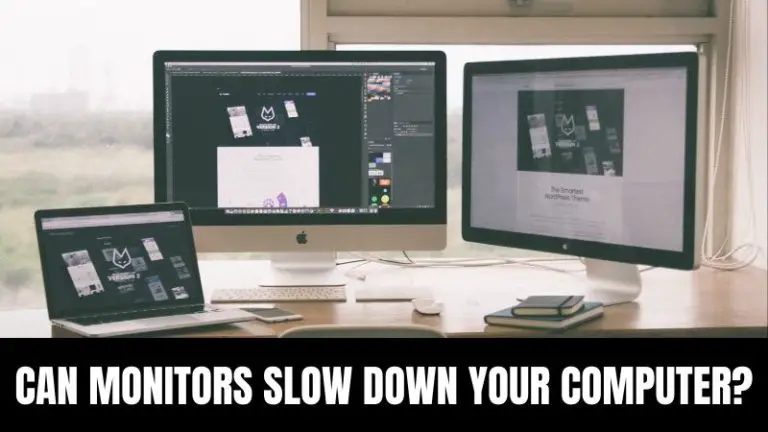Computers slowing down, especially when you are working with some heavy-duty work, can be pretty irritating. And we often end up thinking that our monitor is causing this slowing. Thus, can a monitor slow down your computer?
No, a monitor cannot slow down your computer. Though it can sometimes cause a slight lag while working with heavy software or playing high graphics content games if you are using an outdated video card. However, if you have all the latest specs, it is less likely that your monitor can slow down the computer.
Hence, if you are wondering what is slowing down your computer, you are in the correct place. Today, we will discuss in full detail whether your computer can slow down due to the monitor, including all other reasons for PC slowing down.
Can monitors slow Down your computer?
No, it is significantly less likely that your computer will slow down due to your monitor. However, suppose your PC has a shortage of ram or uses a low-powered graphics card to run faster games or highly configured applications. In that case, your monitor can have a slightly noticeable lagging.
However, if all of your graphics cards are up to current, they will receive automatic upgrades. Despite that, if you see lagging issues, the problem is somewhere else. When your drivers are up to current, it may just be a matter of your system. If your graphics card is of very poor quality, we consider your system hardware as the problem.
Do monitors affect the performance of computers?

Monitors have an impact on gaming and work performance, particularly in situations where high refresh rates and resolution are required. Due to the inefficiency of the display, which won’t be able to create as many panels at once if you don’t have a high-refresh-rate display like a 144Hz or 240Hz monitor, you’ll notice a substantial lag in performance. Likewise, the display panel kind of influences game performance in a wide range of ways.
On the other hand, your display has no bearing on your FPS. This is due to the fact that FPS refers to the number of frames produced by your machine. Your monitor is in charge of image refresh. Frame rate is unaffected by refresh rate. However, if your display has a lower refresh rate capability, the frame rate may be limited.
Will a dual monitor setup slow down the computer?
A dual monitor arrangement will not slow down a computer with a powerful video card, but if you are running demanding games and apps while watching movies on both displays, in which case the graphic card will be subjected to a slight additional burden. As a result, the computer may become slightly slower.
However, twin displays create modest but perceptible latency unless both monitors have the same resolution and operate on a powerful PC. Because the computer must process the pixels from two displays instead of just one, lag occurs. Ensure that all monitors are set to the same performance optimizations to reduce this.
Do three monitors slow down the computer?

Yes, having three monitors will have an effect on performance. Three monitors imply three sets of pixels, or three different pictures that must be rendered, all of which will have an influence on productivity. Furthermore, if there are two or three displays, the FPS will decrease, but only a little, since the GPU renders all.
Because your CPU would have to pre-render three times the amount of information on a treble display panel and then pass it to your video card to produce the rest, you’re getting the CPU to show more data. As a result, a drop in your computer’s overall quality is to be expected.
Can a 4k monitor slow down the computer?

As long as the gear delivering the 4K data is sufficient, there should be no noticeable performance reduction. When it comes to editing in 4K vs. merely showing 4K, the demand loads are vastly different, with editing being far more demanding.
Similarly, the gap between 4K video and 4K static is significant, and editing 4K video is challenging on most generic graphics solutions. If you try to add anything 3D, though, it will suffer.
Now, if your GPU is not powerful enough and doesn’t have the latest specs, then your computer can have a hard time running a 4K monitor. It will suffer from severe lags, eventually slowing down your PC.
For a 4K display to work smoothly without lag or influencing computer performance, the processing capacity of the CPU or GPU must be sufficient in terms of ultimate capability and demonstrable performance.
Factors that can slow down the computer
Even though you might think that your monitor is slowing down your computer, in reality, monitors rarely slow down your computer, and other factors can cause it.

Unwanted clicks from the internet
Many websites are a minefield of potentially hazardous information. As a result, it might be troublesome if you access these websites and click without comprehending what you’re doing.
Fake downloading buttons, huge advertising that lead to sketchy websites, and all kinds of other junk might cause difficulties with your PC.
Even legal downloads are not always secure. While it isn’t as prevalent as it previously was, many free products use pre-selected checkboxes to force you to install third-party trash software. As a result, all of these unwanted apps might cause your computer to slow down.
So, always be careful while browsing through websites and avoid all these shady clicking buttons.
Multiple Apps running together
Several programs open at the same time might cause your computer to slow down. The most serious problem arises from apps that automatically operate in the foreground. This implies they’re using RAM even if you’re not using them.
Keep an eye out while downloading new programs to avoid this. Make sure you clear any check boxes that say, “Automatically run when I start my computer.”
Improper Maintenance
Your computer will slow down if you do not do some simple tune-ups on it from time to time. As a result, ensuring that things are taken care of might be the difference between your laptop operating slowly and performing at its best.
As your system runs, it accumulates files that are only required for a brief period of time. This is a regular component of computer functioning, but if you let these files rack up, they will eventually slow you down.
As a result, it’s critical to regularly remove recent files and logs and scan your computer with an antivirus tool. Maintaining your computer properly will keep it working smoothly.
Regular Reboot
If you do not reboot your computer on a regular basis, your Windows PC may become sluggish. The most significant advantage of restarting in terms of performance is that it flushes your RAM. RAM is volatile, so it begins again every time you reboot.
Many of them can have a buffer overflow when you run applications, which means they consume RAM but never give it to the existing pool. Restarting them will temporarily cure the problem.
How to improve dual monitor performance?

Make sure your twin monitors are set up to utilize the same color system and resolutions to achieve the best results. It’s also good to double-check that you have dual-monitor driver software installed. Also, check the following.
- Your system will work much less hard if you change the color standards to be the same. Because color formats are defined in bits per pixel (bpp), you’ll want to make sure these quantities are consistent across both screens. If they’re not the same, your system will be compelled to use DIBs rather than DDBs.
- If you have two monitors with different resolutions and don’t want to lose the resolution quality on one, raise the Scaling on the higher resolution one while returning each monitor to its native resolution. Ensure that the resolutions are the same or that the higher one is set to a lesser scale setting.
- Your graphics cards are within Steam’s recommended min, and max GPU ranges for the titles you’re attempting to play. Test to see whether your computer is older than five years or if it has had a GPU or chipset updated within that time.
Conclusion
Can a monitor slow down your computer? No, it can’t unless the internals you are using on your PC are too old or outdated. After adopting what we have discussed in this article, you should not encounter any significant delay for activities other than gaming.
However, additional factors might cause your computer to slow down, and we’ve covered them all. So, before you blame your computer’s slowness on display, make sure you check for other system faults.

Hello Good People! This is Pavel and Welcome to PC Delight!
I’m an Electronics Engineer by profession with a passion for Gaming & PC builds. When I came up with the idea for PC Delight, it was my goal to share & offer the very best PC building ideas to tech-loving people like myself.
Since my school days, I’ve been just addicted to gaming & PCs. That leads me to experiment with various ways around the very niche, resulting in great productivity. And I’m here to share those practical experiences. So that next time you start some experiment with your PC builds or struggle to cope with a certain game, I’m here with the solutions. With these philosophies, I started my journey in 2017 and just kept going.
